
views
Raise the head of your bed.
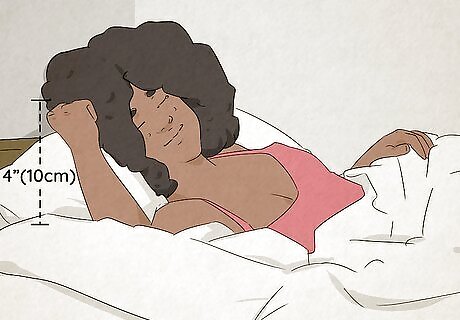
Lifting your mattress takes pressure off your airways while you sleep. Slide a foam wedge underneath your mattress to raise the head end by about 4 inches (10 cm). When you lie down, keep your upper body on the elevated portion of your mattress so you’re less likely to obstruct your throat and nasal passages. Avoid using only pillows to raise your bed since it could make you tilt too far forward and make your snoring worse.
Lie on your side.
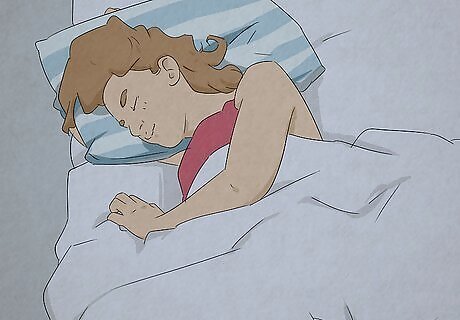
Sleeping on your side opens your throat and helps you breathe. If you normally lie on your back while you’re sleeping, your tongue could block your breathing and cause snoring. Turn on your side when you lie down and try to maintain your position throughout the night. Sleeping on your side may only work half the time, but it’s absolutely worth trying to see if it helps you out! Try sewing a tennis ball to the back of your pajama shirt so you wake up whenever you lie on your back. That way, you train yourself to only sleep on your side.
Try tongue and mouth exercises.
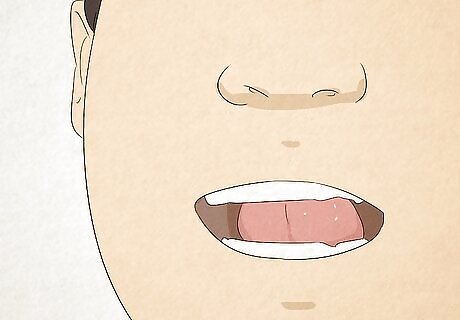
Oral exercises tighten your throat muscles and may reduce symptoms. Pick a few simple exercises to do whenever you have free time. Do the exercises for 10-minute sessions split up between 2–3 times a day to keep strengthening your muscles. After a few months, you should notice a difference. Some exercises you can try include: Tongue slides: Put the tip of your tongue behind your top front teeth. Move your tongue straight back so it rubs against the roof of your mouth 5–10 times. Tongue pushups: Press your tongue against the roof of your mouth as hard as you can for 10 seconds at a time. Repeat the exercise 5 times. Mouth stretches: Tightly purse your lips together to close your mouth. Then, relax your jaw and lips to open your mouth. Repeat the exercise 10 times.
Treat any nasal congestion.
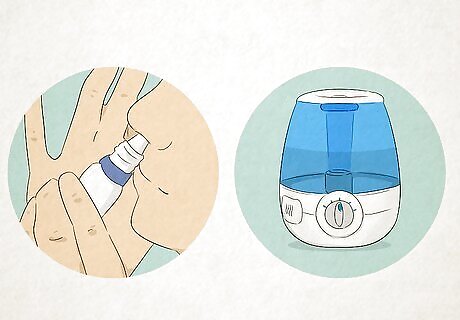
You’re more likely to snore if there’s a blockage in your nose. Before you go to bed, make sure you blow your nose to get rid of any mucus or congestion you’re feeling. If your nose still feels clogged, try using a saline spray or taking a hot shower to help clear your nasal passages. Running a humidifier in your room while you sleep also helps with congestion. If you have allergies, it can make you feel stuffy and cause snoring. Remove any triggers, such as stuffed animals, pets, or down pillows from your room while you sleep. You can also try running an air filter to remove allergens.
Put on nasal strips.
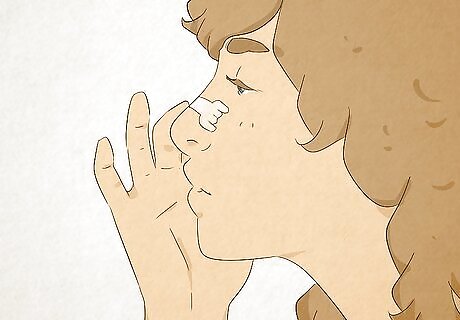
Nasal strips open up your nostrils so it’s easier to breathe. Take a nasal strip and press it down on the bridge of your nose. The strip pulls the sides of your nose out and makes your nasal passages wider so you don’t feel as congested. Leave the strip on throughout the night so you’re less likely to snore. You can buy nasal strips online or from your local pharmacy.
Avoid alcohol and sedatives before bed.
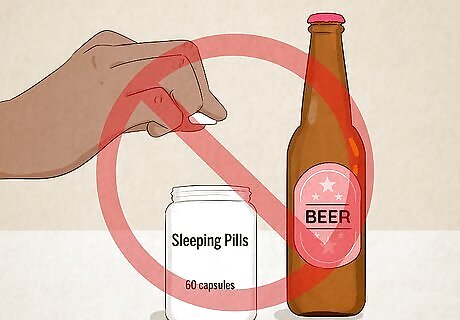
Both alcohol and sleeping pills relax your muscles and close your airways. You don’t need to quit drinking alcohol completely, but only do it in moderation to stay healthy. Have your last alcoholic drink at least 4–5 hours before you plan on going to bed so it has time to pass through your system. Prescription and over-the-counter sleeping pills have the same effect as alcohol, so avoid them completely if possible. If you need to take something to help you sleep, melatonin can help and doesn’t worsen your snoring. You can find melatonin with the vitamin and supplements at your local pharmacy.
Get 7–7.5 hours of sleep each night.
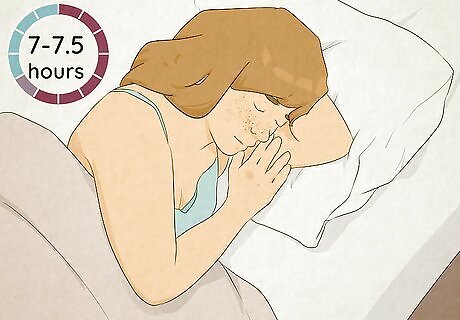
You’re more likely to snore if you don’t get deep sleep at night. Set up a nighttime routine so you go to bed at a reasonable time and get enough sleep to feel well-rested in the morning. If you’re unable to get deep sleep, your body will try to make up for it and could lead to worse snoring.
Try to lose weight.
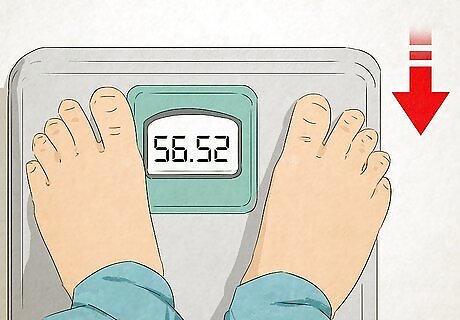
Extra weight puts pressure on your neck and throat when you lie down. If you’re overweight, start incorporating regular exercise into your daily routine. Aim to get at least 150 minutes of moderate exercise in every week to stay healthy. On top of exercise, adjust your diet to cut processed and fatty foods and instead focus on lean meats, vegetables, and whole grains to help with your weight loss. Talk to a doctor to find a diet and exercise plan that’s right for you. There isn’t a way to directly target fat or skin around your neck, but general workouts and dietary changes will eventually make it go away.
Quit smoking.
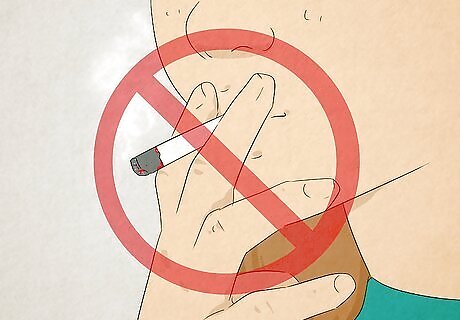
Smoking inflames your airways and causes snoring. The more you smoke, the more you’ll irritate your nose and make it harder to breathe. Do your best to completely quit smoking, especially right before you go to bed. Within a few weeks, you should notice your breathing and snoring improve naturally. Try using a smoking cessation product, such as chewing gum or nicotine patches, to help curb your cravings.
Participate in a sleep study.

Have a doctor monitor your sleep if you can’t solve your snoring problem. If none of the other fixes works well for your snoring, reach out to your doctor and let them know about your condition. Your doctor may have you visit and rest at a sleep center to monitor any underlying causes for snoring, such as obstructive sleep apnea or high blood pressure. After the study, your doctor will give you recommendations for treatment. During the study, your doctor will usually monitor your brain waves, blood oxygen levels, your heart and breathing rates, and your sleep stages.
Wear an oral appliance.
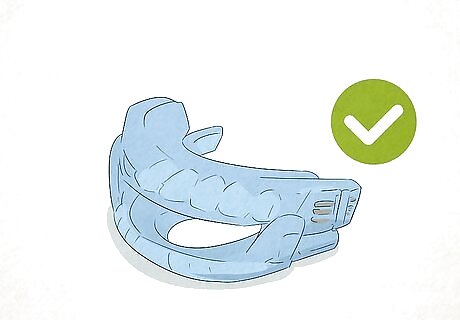
Specialized mouthpieces keep your jaw in an open position. Talk to your doctor or a dental specialist to see if a mouthpiece is the right treatment for you. Right before you go to bed at night, put your mouthpiece in to help open up your air passages. Keep your mouthpiece in throughout the entire night. While mouthpieces are really helpful, it’s possible you might experience some mild side effects like excessive salivation, dry mouth, or jaw pain. Visit a dentist after 6 months of using a mouthpiece to make sure the form still fits and to check on your oral health.
Get a CPAP machine for sleep apnea.
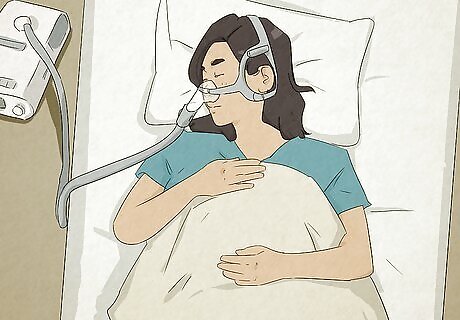
CPAP machines pump air into your nose and keep it open. Your doctor will give you a prescription if they think you need a CPAP machine. Before you go to sleep, place the CPAP mask over your nose and turn it on. The machine will make sure you’re getting enough air while you’re sleeping and prevent snoring since it opens up your nasal passages. CPAP masks might feel a little uncomfortable when you first start using them and they do make noise at night, so it will take a little getting used to.










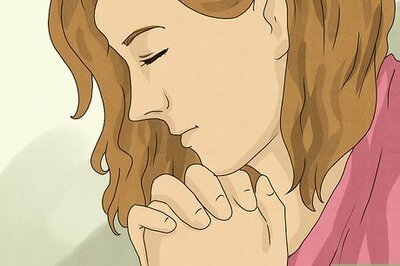








Comments
0 comment